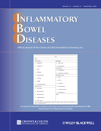Open-label study of adalimumab in patients with ulcerative colitis including those with prior loss of response or intolerance to infliximab†
Conflicts of Interest: William Sandborn, Edward Loftus, Stephen Hanauer, Russell Cohen, and David Rubin have served as consultants for Abbott Laboratories.
Abstract
Background:
The aim of this study was to assess the clinical benefit and tolerability of adalimumab, a fully human monoclonal antibody to tumor necrosis factor (TNF), in patients with ulcerative colitis (UC).
Methods:
Patients with active UC, including those who had lost response or developed intolerance to the chimeric anti-TNF antibody infliximab, were enrolled in a 24-week uncontrolled trial. Patients were treated with subcutaneous adalimumab 160 mg at week 0, 80 mg at week 2, and 40 mg every other week starting at week 4. After week 8 the dose could be escalated to 40 mg weekly for incomplete response. Outcome measures included clinical response and remission and mucosal healing.
Results:
Twenty patients were enrolled, of whom 13 had previously received infliximab. Seven patients had dose escalation of adalimumab between weeks 8 and 16, from 40 mg every other week to 40 mg weekly, due to incomplete response. The rates of clinical response were 25% at week 8 and 50% at week 24. The rates of clinical remission were 5% at week 8 and 20% at week 24. The rate of mucosal healing was 30% at week 8. The rates of clinical response and remission and mucosal healing were similar in infliximab-naïve and previously exposed patients. None of the patients experienced hypersensitivity reactions during treatment with adalimumab.
Conclusions:
Adalimumab is well tolerated and appears to be a clinically beneficial option for patients with UC, including those who have previously lost their response to or cannot tolerate infliximab. (Inflamm Bowel Dis 2009)




